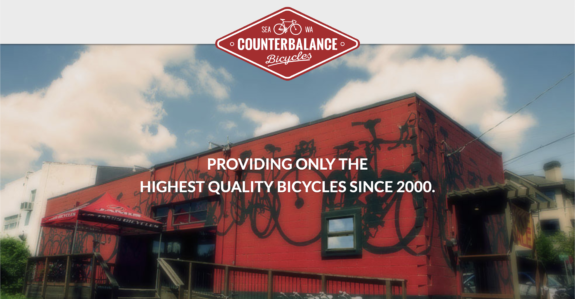Why Counterbalance Bicycles is closing their iconic trailside shop
 From the Counterbalance Bicycles website.
From the Counterbalance Bicycles website.Counterbalance Bicycles is closing, ending a 16-year run in a trailside space that has become almost a part of the Burke-Gilman Trail itself. The shop is just barely off the trail where it crosses NE Blakely Street near U Village, a post Counterbalance has held since moving there from its original namesake location at W Roy Street and Queen Anne Ave (AKA the Counterbalance).
The bike business has been amazing for me," said owner Peter Clark, who has been in ownership of the shop since the beginning. I'm super grateful I've been able to do this for as long as I have." But after 20 years owning a bike shop, Clark said he is just ready to do something else."
Most everything in the shop is on sale, and they are tentatively planning to close for good on or around November 11 and be out of the space by the end of the month. They are currently open Tuesdays-Fridays from 10-6 and Saturdays from 10-5. Clark is seeking to sell the business to someone with a serious offer."
This a tough time for bike shops. The first couple years of the pandemic led to a huge spike in demand for bikes and parts, but supply was limited. Now supply is available, but demand globally has come down hard from its pandemic peak. Meanwhile, competition from online-based direct-to-customer companies keeps growing, a trend under way long before the pandemic.
Universally everybody agrees this is a great place for a shop, but universally everyone agrees this is a terrible time to try to open up a retail shop," said Clark. It was a lot easier to get in 10 or 15 years ago," but now it's harder to find competent staff and margins on items are chopped well below the operating margins as rents go up." These are trends affecting bike shops everywhere, not just in Seattle.
Especially for general purpose cycling shops, it is difficult to convince customers to pay the premium needed to offset all the other costs associated with operating a physical space with knowledgeable staff. As Clark put it, Consumers' understanding of the value of things is informed by the internet." This of course is a problem for many retail businesses, not just bike shops. And Clark said he understands people trying to save money. It's tough times for a lot of folks, and I don't blame them." But bike shops are so much more than just a place to buy accessories or even full bicycles. They are essential bicycle infrastructure for their communities. Their mechanics are capable of keeping people's bikes rolling, and this is a vital service that no online retailer can provide. To put it somewhat bluntly, They'll miss us when we're gone," said Clark.
Break-ins are also a problem not just due to the loss of product but also because fixing damage gets pricey. For example, someone broke their door requiring a $10,000 fix. You know how many tubes you have to sell to make up for a $10,000 loss?" he said. These kinds of unfortunate costs of doing business wouldn't be such a big problem if the core retail business were booming. But with shrinking margins on each sale, all unexpected costs hit that much harder.
However, Clark is not entirely pessimistic about the future of bike shops, though the traditional retail-focused model needs a rethink. There's no shortage of ideas," he said. The question is, Are there energetic and enthusiastic people who have the appetite for it and are willing to follow through?'" For example, he thinks there's a model for bike shops that are ready to address service in a serious way."
But at this point in his career, Clark is not interested in being the person who puts their all into finding a new path to bike shop success. He doesn't have any specific plans for what he does next, saying he is making a big leap of faith that something will come to me."
Seattle has seen shops innovating new ways to find success. Niche and specially shops can charge a premium for their specialty service and expertise. Other shops have attached bike services to food and cafe service, which not only provides a second source of income but also provides an excuse for people to visit more often. I have made many purchases from Good Weather, for example, just because I was there to get coffee and pastry and then remembered that I needed a tool or brake pads or whatever. Getting people in the door is much of the battle for a brick and mortar retail business.
It's certainly worrying to see long-lived general purpose bike shops like Velo and Counterbalance closing. These were shops for normal" bikes, for lack of a better word. They were places to get a new bike that was good enough to last a long time (unlike many very low-end bikes from big box stores) but was not a high-priced specialty item. It's going to be harder to grow cycling in Seattle without shops like Velo and Counterbalance.
Luckily, Seattle still has many excellent shops you can support. It will be exciting to see how people try to innovate different bike shop business models. This is also a great time to pick up a deal from your local shop, many of which are still sitting on inventory they hoped to sell during the summer.